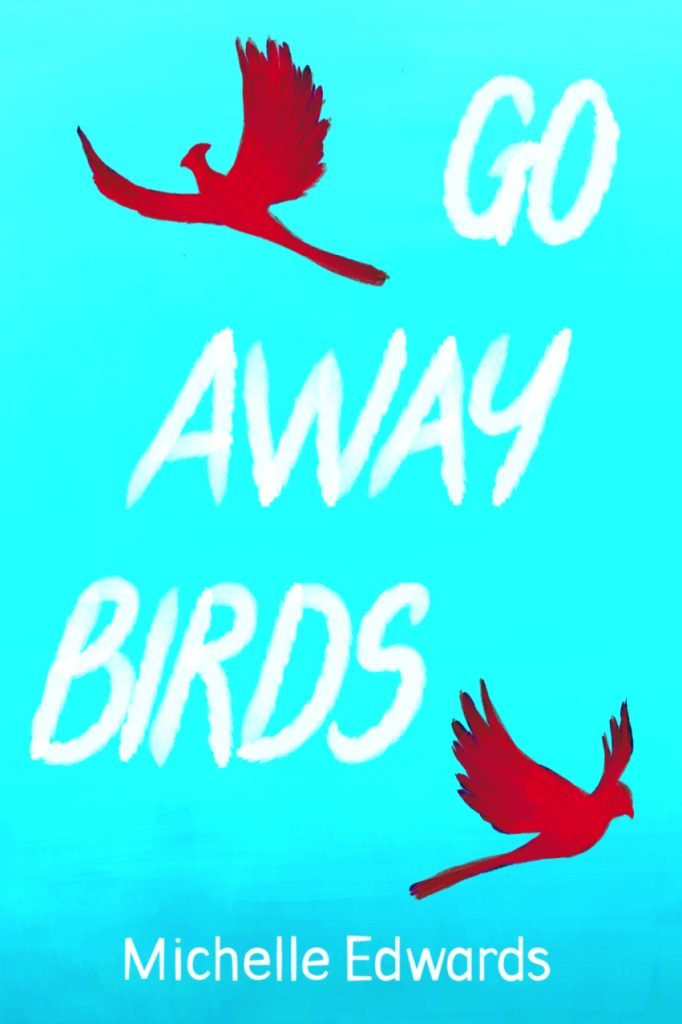The writing life 2

Part Two
Last week I had an email Q&A with Michelle Edwards whose debut novel Go Away Birds is being published by Modjaji next month. That interview covered her writing life, but we weren’t done yet so here she looks at some of the themes and issues she brings to that novel and the new one she is finishing.
Go Away Birds was split in terms of its setting between Cape Town – Scarborough to be exact – and White River. In your new manuscript you split the story between settings in Zambia (some of it in the bush) and Cape Town. You obviously like working in different types of landscapes and cityscapes, what attracts you to these contrasts?
I have moved around a lot in my life, and so my characters do, too. I often feel a deep connection to places I’ve lived, long after I’ve left, and that connection has a shape and a colour. I try to get this kind of connection to place across in my stories, and the settings end up becoming characters in their own right.
It’s also a tool to create a rift and to force a change in the story, and in the characters’ thoughts and feelings, moving them to a totally different space. The contrasts in the settings often mirror the contrasts in the characters’ behaviour and emotions (or vice versa).
I sometimes feel like that’s a weakness of mine, and a kind of laziness. I’m hoping I move on as a writer to be able to convey the changes in a character’s emotional landscape that comes so easily when their literal landscape changes without having to uproot them physically.
Are these places you know well?
Yes, I’ve never written about a place that I’m not familiar with – perhaps because I feel so deeply connected to the places I’ve lived.
I went to boarding school in White River and lived for years in the south peninsula of Cape Town. And from 2018 to 2020 I lived in Lusaka in Zambia but spent a bit of time in the bush.

One thing you do with your characters is push them to the edge. You make life increasingly difficult for them as the story progresses. Now, this is part of what novel writing is all about, creating tension and suspense, however, it’s often not easy: do you agonise over the highly dramatic scenes?
I definitely agonise over scenes of conflict, and the climax.
I always try to under-write the highly dramatic scenes, and to create tension and suspense slowly, ratcheting the pressure up almost imperceptibly until the characters reach breaking point. I try to focus on tangible, physical details – in one of Skye’s most dramatic scenes, her hands go numb, and that’s the only feeling she registers. I try not to use abstract nouns in these scenes – I’d rather not say something like “loneliness overtook her” – I try to think of what those feelings really feel like, the physical effects of them, or the kinds of thoughts those feelings cause.
Dialogue in dramatic scenes is something I agonise over, too. People don’t often say much in real life during conflict – the words themselves aren’t as over the top as we sometimes find in TV or movies. They don’t often put their feelings eloquently into words, but their tone of voice says everything, and that’s what I try to put across.
I suppose the thing I try to do is pare down these scenes as much as possible, and focus on the small details – the look in a character’s eye, the twitch of a mouth or a rolling of the shoulders, especially when the characters in conflict know each other well, as these gestures convey so much. When we’re in situations of conflict, we don’t even think very clearly, and so I try to get the physical sensations across – the tingling of a scalp, the prickle of perspiration in a character’s armpits, Skye’s numb hands.
In both Go Away Birds and your work in progress, you explore themes of love between partners, parental love, compassion, betrayal, in short the difficulties (and rewards) of relationships. You almost push history aside in order to find meaning and purpose in daily life?
There’s a lot of history that comes up in my work in progress from the middle onwards – the protagonist finds herself falling straight back into her past and she has to pick apart the difficulties she went through as a teenager.
But yes, it’s daily life that fascinates me. Little details: the equivalent of mud between the toes. That’s what relationships are about, to my mind. The tiniest things given and received, day after day. I love giving my characters things to do with their hands – they make a lot of tea!
Food also plays a big role, especially in Go Away Birds, because Skye is a chef, and her mother has a very different attitude to food to what she does, which seems like a small detail, but in the context of a family can amount to a lot of tension – and can also be the result of a history of tension.
So much of what I want to convey about characters is contained in their gestures. The way the protagonist of my current manuscript holds her daughter’s arm out to spray mosquito repellent on it – there’s something so competent and caring in that very everyday, simple gesture. The way Cam, in Go Away Birds, fresh out of the sea, pulls Skye back into his damp body after she shifts away – that tells you a lot about his entitlement and selfishness.
Central to Go Away Birds is the protagonist Skye. Where did she come from? Had she been nagging at you for some time or was it only when you sat down to write that she leapt to the fore?
Skye had been nagging at me for almost a year before I sat down to write the story in 2015. I have no idea where she came from or when I first “met” her. She was just there – this quiet woman who was deeply confident in who she was and capable in so many ways except in understanding her own feelings. Rory, her sister-in-law, arrived at the same time, perhaps because she is Skye’s polar opposite. Every time I had a spare moment, especially when I was out on runs, I would hear Skye and Rory’s conversations in my head, until it got to the point where I just had to write them down and let their story play out.
I don’t know if other writers feel this way, but this is exactly how I experienced the characters in my second manuscript. They arrived fully formed in the space of a few hours, and then they were there, having conversations, antagonising and hurting and healing and teasing one another – almost without my input.
Of course, once I start writing them, I know I have agency over their stories, but I don’t have much agency over who they are as people. I see them and feel them very clearly and know them intimately.
As I’ve mentioned you give your characters a rough time, and Skye particularly. However, she is an immensely strong figure and in charge of her life despite all. Was she an easy character to write?
In the sense that she didn’t know herself very well, she was difficult to write, especially in the first person. Bringing her to a place where she could see herself more clearly was tricky, and I hope I succeeded.
In the first part of our interview you mentioned that an event had triggered your second novel. I guess this often happens but sometimes sticking too closely to the event can dampen the imagination. Did you find you had to write away from the actual event or were you simply able to incorporate it into your story?
There was one detail, perhaps the most traumatic of the whole event for me, that I wrote exactly as it happened to me. I was lucky enough that that single detail is all I had to live with. I had to imagine the event spiralling out of control to the extent that it did for the characters in the novel. The event in the novel that sets everything off is something that had, in fact, happened in real life a few years before, in the exact place where my own very minor (by comparison) scare took place, so I was able to see it play out very clearly. Writing the scene did require me to put myself in a particular circumstance in my imagination, but I had a ton of help.
The aftermath required a lot more imagination, combined with hours and hours of online investigation into the legalities of transporting human remains across borders.
What’s next? When do you expect to finish writing your second novel and do you have plans for a third?
I have to be honest, I haven’t managed to get back to the manuscript in progress yet this year. I’ve been doing some work on the marketing of Go Away Birds, and family obligations, including home schooling requirements for my daughter, plus being in a demanding time at work means the manuscript has got short shrift.
The characters still keep me company on my runs, though, and I’ve nailed a few more scenes in my head since the end of last year, so as soon as I have time, I’ll be right back at it. At this rate I will only have finished it in about six months’ time, if I can make sure to put an hour a day aside to write. This is why the Masterclass is invaluable! I wouldn’t have had time to do it justice this year, but I know that if I had signed up, I would have definitely made some headway!
I would like to say I have an idea for a third novel, but I don’t. Not yet. I have a new setting that I’d like to explore, though, and for me, that tends to be the first step.
The Go Away Birds is published by Modjaji in March.
Get more out of your writing.
Click here for a short course on Writing Fiction. The next course starts on 15 March 2021. Click here for a short course on writing a memoir, Writing Reality. The next course starts on 29 March 2021. If you’re looking for supervision while writing your novel or memoir, join The Writers’ Masterclass. It’s not too late to join the class for 2021.